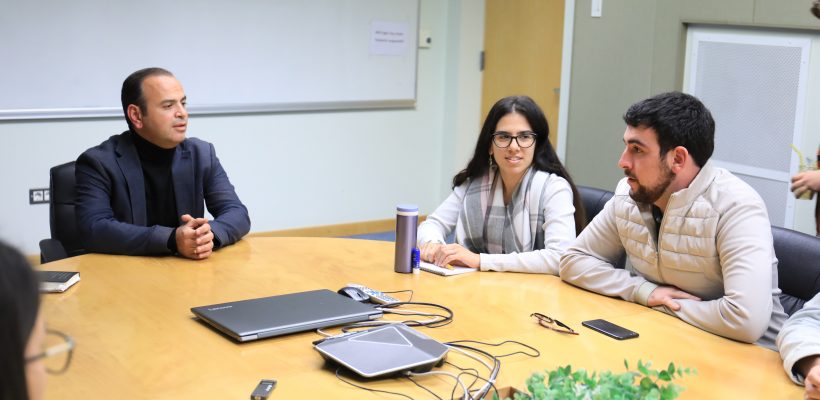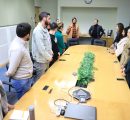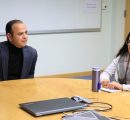
Zareh Sinanyan Explores Ways to Bring Diasporan Students to Armenia
3 min readYEREVAN, Armenia – On November 12, 2019, the American University of Armenia (AUA) hosted Zareh Sinanyan, High Commissioner for Diaspora Affairs of the Republic of Armenia (RA), and Sara Anjargolian, chief of staff of the High Commissioner for Diaspora Affairs. Their visit aimed at discussing ways in which the government can motivate Armenian students from the diaspora to come and study in Armenia.
Sinanyan and Anjargolian were first hosted at the AUA President’s office, where they discussed international recruitment and collaboration between AUA and the Office of the High Commissioner for Diaspora Affairs.
“AUA has identified internationalization as one of its priorities. This agenda includes the pursuit of international grant opportunities; the identification of international partners for student, faculty and staff mobilities; capacity-building projects; and research collaborations. Partnerships with public and private sectors, diasporan institutions and individuals would be instrumental in reaching AUA’s goals,” said AUA Provost Dr. Randall Rhodes.
The visit continued with an informal conversation with diasporan students enrolled at AUA. Attending the meeting were 10 students from Syria, Georgia, U.S., Iran, Lebanon, and Ukraine. Each student spoke about what had motivated them to study at AUA. Throughout the conversation, everyone brainstormed on ways to engage more diasporan students and raise awareness of the various opportunities available in Armenia.
“I am very fortunate to meet all of you and I expect to hear from you about your experiences living in Armenia and studying at AUA. I am convinced that once diasporan Armenians come here, they can’t believe where they are. They discover their homeland from a new and more positive perspective. Once they come here, they don’t want to leave or they want to keep coming back. So the question is: How do we bring them here? What can we do to promote Armenia? What do you think we and the government can do to motivate more diasporan students to come and study at AUA and other universities in Armenia?” Sinanyan asked.
One of the students suggested that the Office of the High Commissioner for Diaspora Affairs initiate tours of the AUA campus for high school students from the Diaspora. The students agreed that along with presenting the academic programs of the University, there is a need to publicize the various financial aid services that AUA offers.
Anjargolian wondered how many of the present students would be willing to become student ambassadors in their home communities, spreading the word about their University while home on vacation and after graduation. She suggested organizing official informative days for high school students in their local communities.
Arina Zohrabian, Director of Admissions, listed some of the advantages that diasporan students would get at AUA. Among those are tuition assistance, financial aid and merit scholarships: an automatic tuition subsidy for citizens of the Republic of Armenia and holders of Armenian special residency status; merit-based scholarships both for Armenian citizens and international students; Aurora Gratitude Scholarship for citizens of Egypt, Georgia, Iran, Iraq, Jordan, Lebanon, Russia, and Syria, which may cover up to the full cost of tuition and in some cases provide housing and travel support. As an additional asset, Zohrabian also mentioned that the construction of the student residence with a capacity for housing over 60 students will be completed by June 2020. This project was made possible thanks to the generous grant of $999,000 by the Office of American Schools and Hospitals Abroad (ASHA) of the United States Agency for International Development (USAID) and philanthropists K. George and Dr. Carolann Najarian who had donated the semi-constructed building to the University.
Founded in 1991, the American University of Armenia (AUA) is a private, independent university located in Yerevan, Armenia, affiliated with the University of California, and accredited by the WASC Senior College and University Commission in the United States. AUA provides local and international students with Western-style education through top-quality undergraduate, graduate, and certificate programs, promotes research and innovation, encourages civic engagement and community service, and fosters democratic values.
- Sara Anjargolian and Zareh Sinanyan







